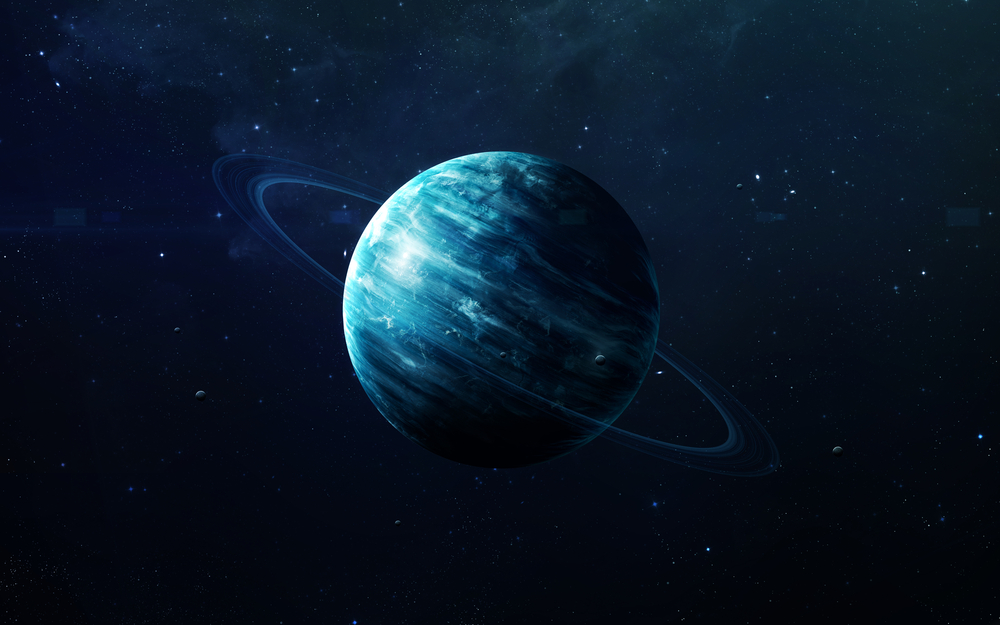
Astrology has been typically dismissed as a pseudoscience, yet it’s enjoying more popularity than ever. Those who study it in depth do so for many reasons, including pure fascination with the subject and the desire to understand the world around them. Thanks to our modern scientific knowledge, most objects in our solar system are now included in astrological practices. Uranus, a recently discovered distant planet, adds greater complexity within horoscopes and birth charts.
Quick Facts About the Seventh Planet
Uranus possesses several unusual characteristics. With an atypical elliptical orbit, its distance from our sun ranges between 1.6 and 1.98 billion miles away. As a gas giant, it has no solid surface and has a blue-hued atmosphere containing high quantities of hydrogen, helium, water, and methane. Uranus exhibits a retrograde rotation, meaning that it spins clockwise instead of counterclockwise like most other celestial objects. Its polar axis is almost exactly parallel to its orbital plane, causing it to tip onto its side. Barely visible in telescopes, its faint set of rings encircle it vertically around the equator. One day on Uranus lasts a little over 17 hours while it takes 84 years to make one complete solar orbit.
Unlike the classical planets that are readily visible in the night sky, Uranus is dim, slow-moving, and extremely remote. NASA explains that our ancient ancestors probably mistook it as a star because of these characteristics. That’s also why Uranus wasn’t recognized until 1871 when English astronomer William Herschel saw it through his telescope. Encyclopedia Britannica reveals that Herschel first called it “Georgium Sidus.” Eventually, it was christened after Greeks’ primordial sky deity who was also Saturn’s father. Of course, the name provokes chuckling from adults and children alike. Thankfully, Dictionary.com provides an alternative pronunciation: “YOOR-uh-nuhs.”
Uranus’s Role in Modern Western Astronomy
Because of its more recent discovery, Uranus is not part of classical astrology. It’s not exactly clear when contemporary astrologers adopted the planet into their methodologies. AstroStyle discloses that it was ultimately associated with Aquarius, a sign of innovative future-thinking energies. AstroStyle also mentions Aquarius’s rulership over the 11th house of the horoscope that governs teams, society, electronic media, humanitarian concerns, science fiction, and futuristic thought. Mystica Astrology describes Uranus as a planet of the higher mind bringing originality, rebellion, chaos, and trauma and energies capable of disrupting the status quo.
How Uranus Affects Signs and Houses
Uranus’s tumultuous power may yield interesting outcomes, depending on its sign and house placements within an individual’s birth chart. Astro Library summarizes Uranus’s impacts in each zodiac sign. For instance, Uranus can lend extra power and intensity when in Scorpio while being at odds in Taurus with the bull’s natural desire for convention. Astrologers also believe that similar effects are evident in horoscope houses. The Astro Codex explains these in detail, with examples such as instability when in the relationship-oriented seventh house yet boosting the potential for friendships and social connections in the 11th house.
Owing to its lengthy orbital period, Uranus takes around seven years to travel through each zodiac sign. However, Cafe Astrology divulges that it’s frequently in retrograde. Astrologers speculate that a retrograde Uranus in an individual’s birth chart could cause that person to fear change, hide idiosyncratic traits, and distrust technology.
A Modern Planet for Modern Times?
Even though Uranus is a newly discovered celestial object, astrologers have integrated it into their methods and ideologies. Birth charts and horoscopes now reflect how its frenzied and tempestuous effects lend additional nuances to an individual’s personality. Moreover, astrologists believe that its lengthy cycles of turbulence and change also affect our daily lives. While some of popular culture focuses on supernatural consequences, astronomers and scientists will undoubtedly keep trying to study and understand this distant body in our solar system.

